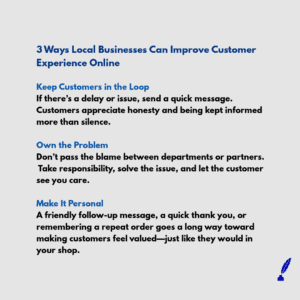For over 5 years, I shopped online at our local supermarket. It was reliable, convenient, and connected me to a familiar place in my own community. Then, the shop was sold to a multinational chain and suddenly, I became a blue dot on the map again.
I had to find a new supplier to deliver my weekly groceries. My blue dot gave me three options. What I discovered wasn’t just about groceries, it was about how customer experience makes or breaks local trust.
My First Blue Dot Choice
The first supermarket I tried had a wide range of delivery slots—so far, so good.
But in just six weeks:
-
Two deliveries were late by 1.5–2 hours.
-
The first time, there was no message, no apology. “Things happen,” I thought.
-
The second time, I asked the driver. He told me about all his problems, delays, and frustrations, and suggested I contact the office for a refund of the delivery charge.
So I did.
The office asked permission to pass my query to the delivery company. A few days later, I got a call, not with an apology, but with another list of problems from their side.
When I explained, “I don’t need your problems, I just want my groceries delivered when I book them—or at least the option to reschedule,” the response was: “That’s down to the shop.”
I never got my refund. I never got a follow-up.
The Lesson: The Blue Dot Isn’t the Whole Story
Here’s the point:
-
Being found is only step one.
-
Fulfilling the order isn’t enough.
-
Customer service is what builds trust and loyalty.
Behind every blue dot is a real person with real needs. When businesses fail to communicate, fail to follow through, or treat customers as inconveniences, they miss the opportunity to turn a one-time order into a long-term relationship.
What This Means for Local Businesses 
If you’re a local business in Virginia Co Cavan, here’s what this story shows:
- Communication matters. If something goes wrong, customers want to hear from you before they have to chase.
- Ownership matters. Don’t pass problems between departments—solve them.
- Connection matters. Customers want to feel as valued online as they do face-to-face in your shop.
This is how small businesses can win against multinationals: not by competing on price, but by offering a better, more human experience.
Bringing It Back to Virginia Pages
At Virginia Pages, our goal is to connect those blue dots not just so locals can find the services they need, but so they can trust the people behind them.
That’s why the Virginia Pages Network isn’t just about listings. It’s about building a space where:
-
Businesses can share updates, specials, and behind-the-scenes stories.
-
Customers can ask questions, leave feedback, and feel heard.
-
The community can grow stronger through real conversations and real care.
Because at the end of the day, people don’t just want groceries on the doorstep.
They want to feel like they still matter.

